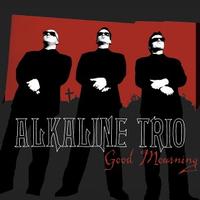Rising up from the streets of the Windy City came Alkaline Trio, a three piece pop-punk band of young men with broken hearts, bloody revenge, and a favorite past time of consuming mass amounts of alcohol. Touring their way up from the "just about anyone can play here" Fireside Bowl to the more revered Metro, the band established a steady fan base in Chicago, gaining local popularity while busting out three full length albums along with a few EP's and split with Hot Water Music. After nearly six years of touring and recording three buzz-worthy albums titled, respectively, Goddamit, Maybe I'll Catch Fire, and From Here to Infirmary, Alkaline trio has scrounged up enough money to record their latest effort, Good Mourning, a polished, glossy, pop-punk album that screams from the bottom of its broken heart and sticks its creator's original sound. It's true that Good Mourning is the most radio-friendly album by the band thus far, but anyone who has kept their ears on this band from the beginning would be lying if they said they never saw it coming. Alkaline Trio has become progressively more pop thank punk over the last few years while retaining its original intent (get the anger out.) The reason this album sets the band apart from other acts who have broken into the mainstream with polished-to-perfection recordings is that is album is good, great even.
Musical peers in the world of emo have recently released "sellout" albums such as Dashboard Confessional's "A mark, a mission, a brand, a scar" and Saves the Day's newest "In Reverie," both of which are flawless productions, but were obviously recorded with a "give em what they want" mentality ("they" being the media.) These aren't necessarily bad albums, but the sounds of both is a far cry from the sincerity of both bands previous efforts. Good Mourning manages to retain the darkly morbid lyrics of albums past as well as its catchy hooks and sing along quality without giving into MTV's ideas of what pop-punk should sound like.
Ending in this album, the history of Alkaline Trio is the perfect timeline of a sound in progress. Despite the aspects they share with other bands of the emo-core culture, such as the use of three chords for twelve different songs, or the layering of high pitched screams over crooning tenors, what gives this album its sparkle and lasting quality is the unmatchable lyrics of Matt Skiba. Instead of encouraging the emo kid to brood and cry beneath the lenses of his typically Weezeresque thick frame glasses, Skiba promotes amnesia through heavy drinking and revenge through violence.
On songs "This Could Be Love" and "Donner Party (up all night)" he illustrates on the former a brutal fantasy of his own bloody death, and on the latter he pries into the minds of the unfortunate victims of nature in the covered wagon. The real kicker on this album is the final track "Blue in the face." This song goes full blast on the demonic and grim lyrics, but offers, instead of screams and power chords, a stripped down folk style song of lost love and regret. Executed beautifully with a solo acoustic guitar and Skiba's thousand-cigarette rasp, the song shows a glimpse of potential in the direction of Nirvana's legendary "Unplugged" album.
What is easily the most formulaic song on the album "We've Had Enough" beats back the boredom of verse-chorus- verse with its meaningful, if slightly overdone message. The song bashes the state of radio today, begging us to turn it off, claiming it so disgraceful even the dead abhor it.
It may be a step closer to media love and MTV commercialism, but this album is by no means a sellout record. One could be tempted to think so after the first listen, but upon giving it a second chance, one is likely to find this album equally as wicked and cheerfully morbid as any of Alkaline Trio's previous works. They may have had enough, but we haven't.
